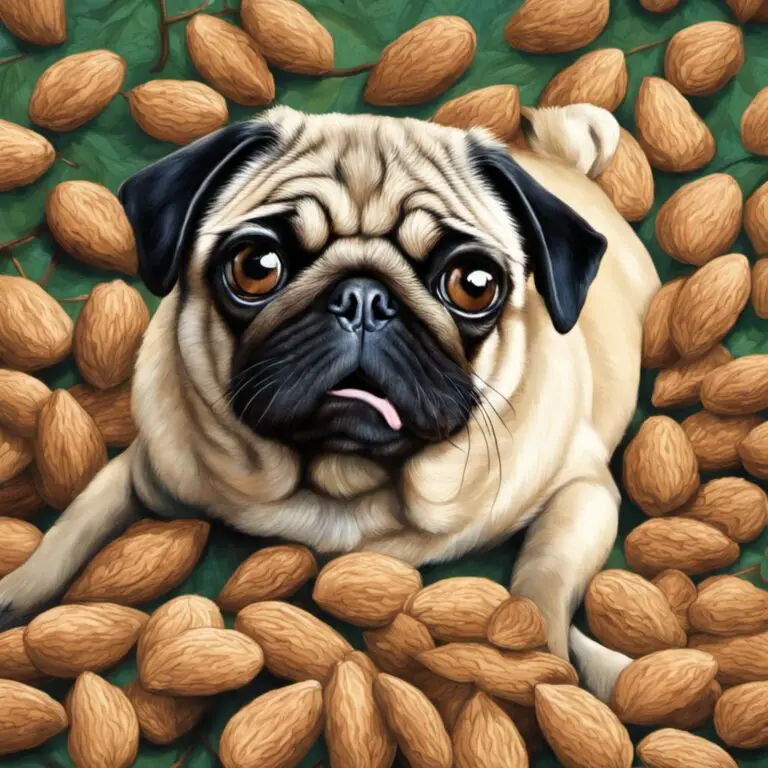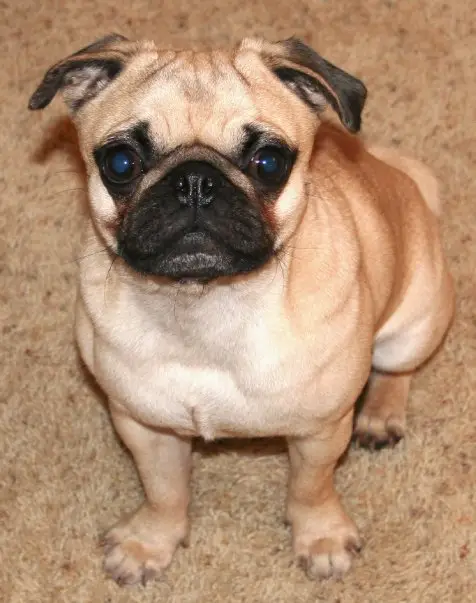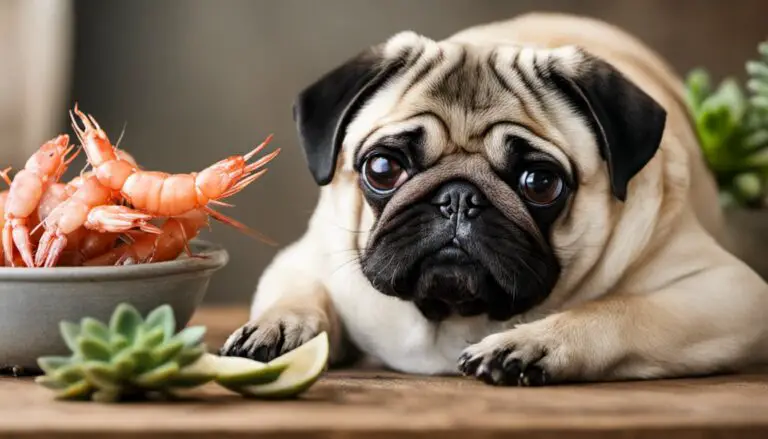Can Pugs Eat Pork? Unraveling the Truth About Pugs’ Diet
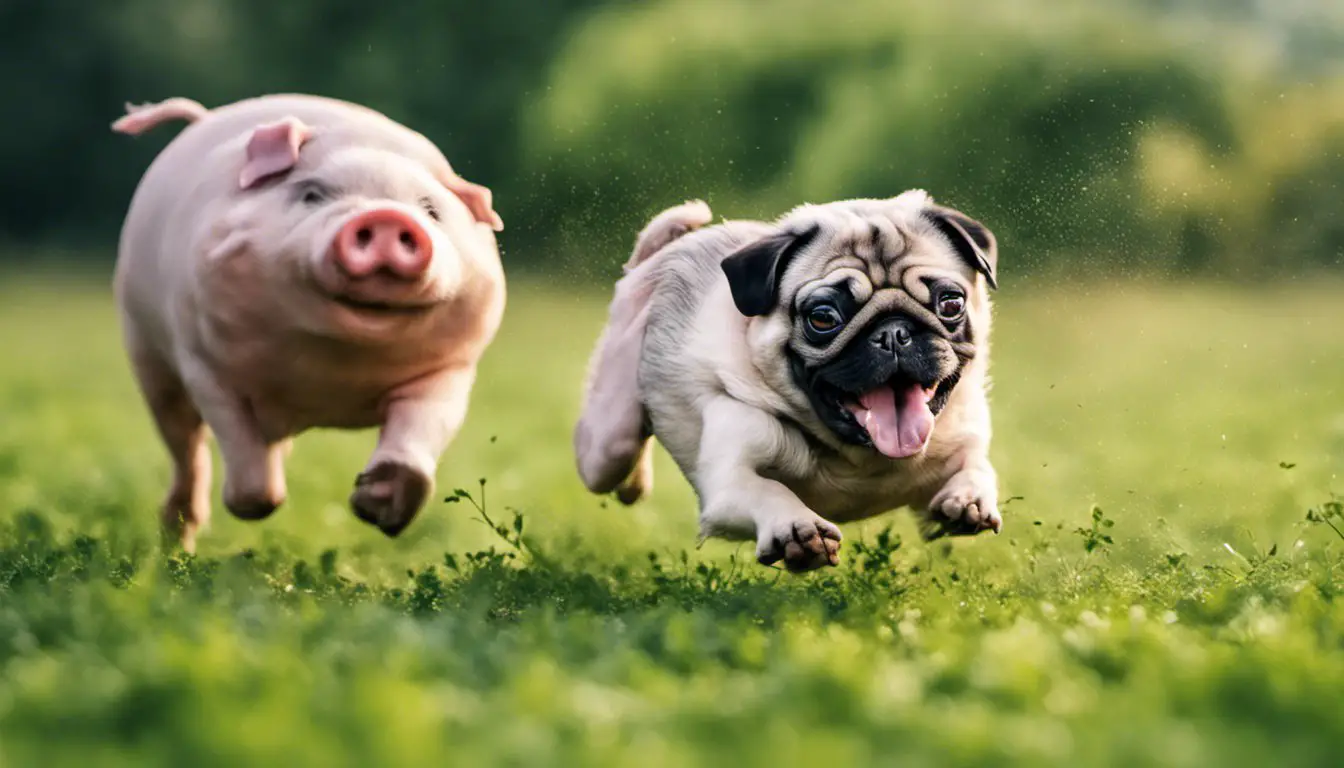
As a pug owner, you may wonder, Can Pugs Eat Pork? With so many foods potentially harming dogs, you must be cautious about what you’re feeding them. Ensuring you only offer them safe and suitable food is critical for their health and well-being.
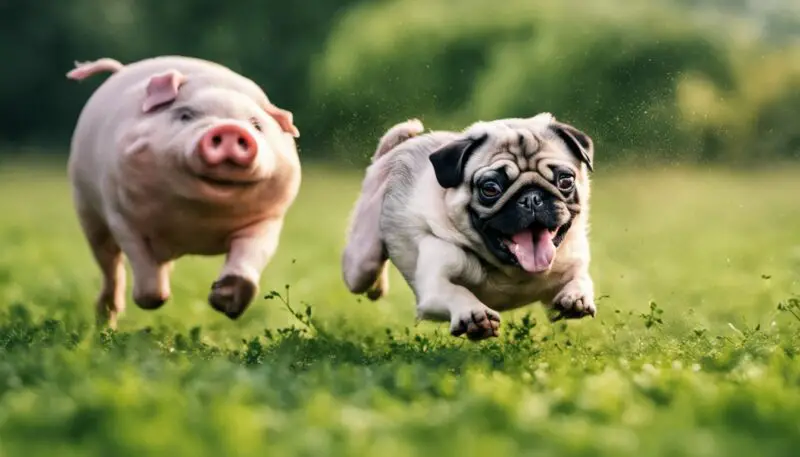
When it comes to pork, the good news is that your pug can safely eat plain, cooked pork. It’s crucial, however, to keep the preparation simple and avoid any seasonings or spices that could harm your pug’s stomach source. Additionally, it’s worth noting that only cooked pork should be given to your dog, as raw or undercooked pork can contain parasites that could cause discomfort and illness source.
Understanding your pug’s dietary needs will help you keep them happy and healthy. When feeding your pug pork, remember to keep it simple, cooked, and unseasoned. Always monitor their reactions to any new foods to ensure they are safe and well-tolerated.
Contents
Table of Contents
Can Pugs Eat Pork?
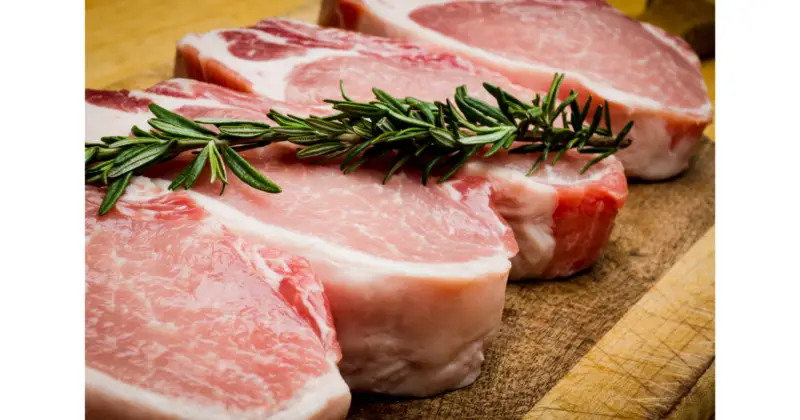
As a pug owner, you may wonder if feeding your pet pork is safe. Rest assured, pugs can eat pork if it’s prepared correctly. There are some rules to follow to keep your furry friend happy and healthy.
Get The Free Food Eating Guide That Keeps My Pug Happy and Playful Even at 13 Years Old
100% Beginner Friendly & Lists Real Foods Your Pug Can Actually Eat!

Firstly, make sure the pork is cooked thoroughly. Raw and undercooked pork can cause serious health issues for your pug, such as bacterial infections and parasites. Keep pork for your pug plain, and avoid any seasonings or spices, as some ingredients can be toxic to dogs.
Pork is a good source of protein and other essential nutrients, such as iron, selenium, and zinc1. Including pork in your dog’s diet can provide health benefits if you feed it in moderation. It’s important not to overfeed your pug with pork, as this can lead to obesity and other health issues.
Avoid feeding your pug processed forms of pork, such as bacon, ham, or sausage, since they typically contain high amounts of salt and preservatives, which may harm your pug’s health.
Incorporate pork into your pug’s diet by offering small bites as a treat or mix it with their regular dry dog food. You can also try different cuts of pork like tenderloin, loin, or shoulder. Just be careful with the bones – make sure to remove all bones from the pork before feeding it to your pug, as they can pose a choking hazard or cause damage to your dog’s digestive system.
Though pork is safe for pugs to eat, remember that every dog is different. Some pugs might have allergies or intolerances to certain meats, including pork. If you notice any adverse reactions, such as vomiting, diarrhea, or skin irritations, stop feeding pork to your pug and consult your vet.
In summary, cooked plain pork is generally safe for pugs, but always observe proper portions and feeding practices to maintain your pug’s overall health.
Understanding a Pug’s Diet
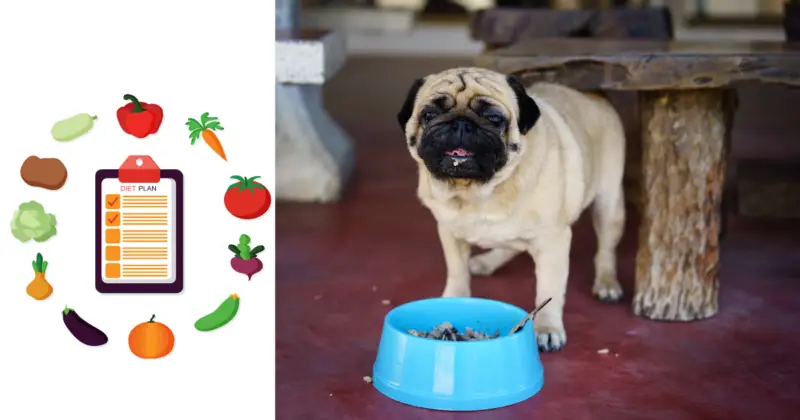
A balanced diet is essential for maintaining your pug’s health and well-being. Providing the right nutrients in appropriate quantities will ensure your pug maintains a healthy weight, has a shiny coat, and stays energetic. When planning your pug’s meals, it’s important to know which foods are safe and nutritious for them to eat.
Like all dogs, Pugs require a diet rich in protein, vitamins, and minerals. A high-quality commercial dry dog food formulated specifically for pugs, like the Royal Canin Breed Health Nutrition Pug Dry Dog Food, will cater to their unique nutritional needs. This food is designed for purebred pugs aged 10 months and up.
In addition to commercial dog food, you can also incorporate safe, wholesome, and natural foods into your pug’s diet. For instance, your pug can benefit from consuming small amounts of boiled or scrambled eggs, as they are high in protein, fatty acids, vitamins, and fatty acids that support growth and development. Remember to feed them organically grown eggs from free-range farm hens.
When considering the question: “Can pugs eat pork?” the answer is yes – but with certain precautions. Serving your pug plain, cooked pork without any seasonings or spices is important. According to the American Kennel Club, cooked pork is safe for dogs, but only if it’s kept simple and free from harmful additives.
Feeding your pug a diverse diet rich in healthy foods can improve their quality of life. However, it’s crucial always to be aware of the portion sizes and frequency of meals. Pugs are prone to obesity, so monitoring their calorie intake and adjusting their diet based on their activity level will help maintain an ideal weight and energy level.
Nutritional Content of Pork

Pork is a popular meat choice among many dog owners because of its nutritional properties. When considering whether or not to feed your pug pork, it is essential to understand the nutritional content of this tasty meat to ensure it contributes positively to your pet’s diet.
Pork is an excellent source of high-quality protein, containing around 27g of protein per 100g. This protein abundance helps support and maintain your dog’s muscle mass, ensuring a healthy and fit pug.
Regarding fat content, pork can be quite high, depending on the cut. Some cuts may contain more than 20% fat, potentially contributing to obesity in your pet if consumed regularly and in large amounts. Monitoring the fat content of the pork you offer your pug is important, and choosing leaner cuts such as pork loin or tenderloin can help reduce overall fat intake.
Pork also contains several essential vitamins and minerals that contribute to the overall health of your pug. These include B vitamins, particularly thiamine, niacin, and riboflavin, which help support your dog’s metabolism and energy levels. Pork is also rich in minerals, such as phosphorus and potassium, crucial for bone health and maintaining a balanced electrolyte status in your pug’s body.
Calorically speaking, depending on the cut of pork, there can be anywhere from 150 to 350 calories in a 100g serving. Remember to account for these calories when feeding pork to your pug and adjust their overall daily caloric intake accordingly.
Adding pork to your pug’s diet can provide essential nutrients, but it’s important to be mindful of the fat content and portion sizes. Balance and moderation are key when incorporating pork into their meals while offering various protein sources for a well-rounded diet.
Potential Dangers of Pork For Pugs
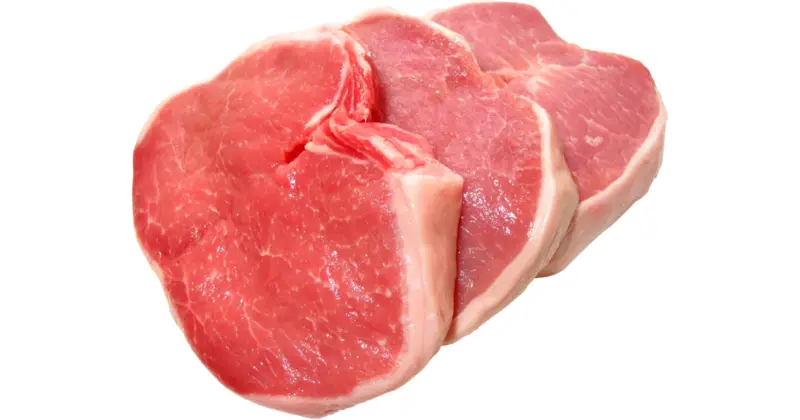
If not properly monitored or prepared, feeding your pug pork can pose several risks. One potential danger is the presence of parasites in raw or undercooked pork, which can cause serious health issues for your pug. Always ensure pork is fully cooked before feeding it to your pet to avoid parasite-related problems.
Another issue to be cautious of is the ingredients and seasonings used in preparing pork. Onions and garlic, for example, are toxic for dogs and can cause vomiting, diarrhea, and even poisoning. Make sure to avoid these ingredients and keep your pug’s palate in mind when cooking.
Choking hazards are also a concern; bone fragments or large chunks of meat can easily become lodged in a pug’s throat due to their brachycephalic facial structure. Always cut the pork into small, bite-sized pieces to keep your pug safe and remove any bones before serving.
Certain ingredients can be dangerous, but overfeeding your pug with pork may pose risks. Obesity is a common issue among pugs, and consuming excessive amounts of pork can contribute to unhealthy weight gain. Overindulging in pork could also lead to bloat, a potentially fatal condition for dogs. Make sure to moderate your pug’s consumption of pork and balance it with a nutrient-dense diet.
In conclusion, while pork can be a tasty treat for your pug when properly prepared and fed in moderation, it’s crucial to be aware of its potential dangers. By being attentive to your pug’s dietary needs and avoiding harmful ingredients, you’ll help ensure their safety and overall well-being.
The Effects of Feeding Pugs Fatty Foods
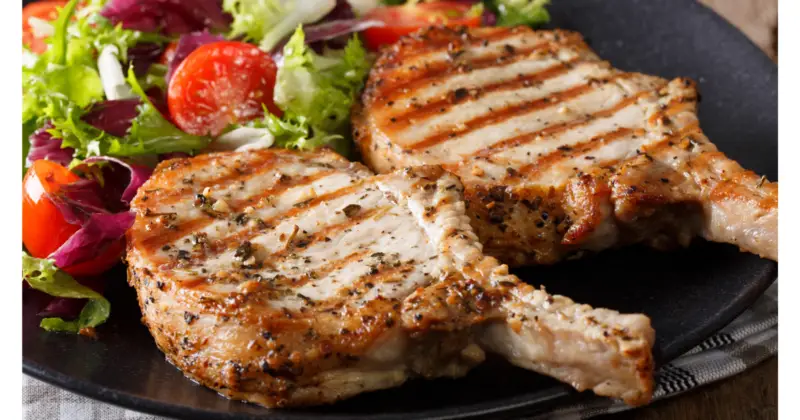
Feeding your pug fatty foods can have several negative consequences on their health. One of the potential issues is the risk of developing pancreatitis. This inflammation of the pancreas can occur when your pug consumes a diet high in fats. Pancreatitis can lead to abdominal pain, vomiting, and diarrhea, putting your pug in distress.
You should also consider the impact of fatty foods on your pug’s weight. Pugs are known to be prone to obesity and carrying extra weight can further exacerbate health issues. Overweight pugs are at an increased risk for joint problems, heart disease, and respiratory issues. Maintaining a healthy diet and exercise routine for your pug is essential to prevent these weight-related complications.
Another potential risk of feeding your pug fatty foods is inflammation. High-fat diets are known to promote inflammation throughout the body, which can contribute to several chronic diseases. This inflammation can affect your pug’s joints, skin, and other organs, leading to discomfort and potentially long-term health problems.
In conclusion, ensuring that your pug receives a balanced and nutritious diet is crucial to maintain their overall health. Avoid feeding them fatty foods such as pork and instead focus on lean proteins like chicken and turkey. By keeping your pug’s diet in check, you can avoid unnecessary health issues and ensure their well-being.
Risk of Diseases and Parasites in Raw Pork
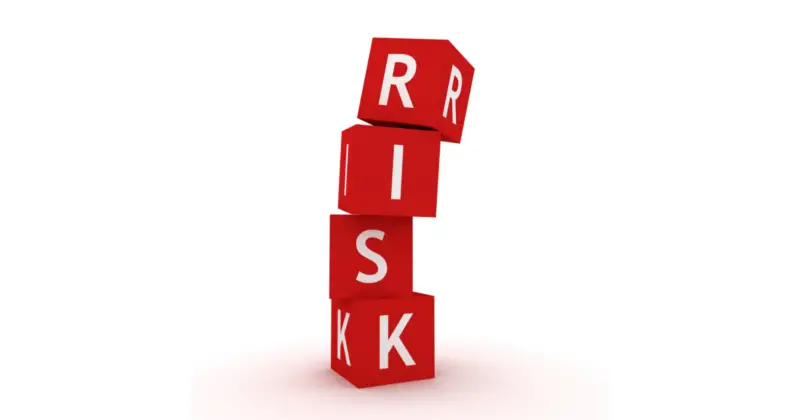
When it comes to feeding your pug, knowing the risks associated with raw pork is essential. Raw pork can contain harmful parasites and bacteria, potentially leading to infection in your beloved pet.
One of the primary concerns with feeding raw pork to your pug is the potential presence of a parasite called trichinella, which can cause the infection known as trichinosis. To avoid this infection, proper cooking of the pork is vital.
Aside from parasites like trichinella, bacteria such as salmonella and E. coli can also be present in raw pork. These bacteria harm your pug and you as a pet owner. As a result, it is crucial that you avoid feeding your pug raw pork to ensure they and you stay safe from these harmful pathogens found in uncooked meat. You can learn more about raw pork safety concerns in this article.
Additionally, the high-fat content in pork can lead to pancreatitis and other digestive troubles if consumed often by your pug. Keeping your pet’s diet well-balanced is essential and consider offering lower-fat meat options to maintain their health.
In conclusion, while giving your pug a taste of raw pork may be tempting, keeping their best interests in mind is key. Providing cooked pork, free from parasites and bacteria, and ensuring a balanced diet will help prevent any unwanted health issues for your pug. Stay informed and consider the potential risks before introducing new foods to your pet’s diet.
Can Pugs Eat Pork? Watch this
The Importance of Cooking Pork
When it comes to feeding your pug, it’s essential to properly cook pork before serving it to them. Raw pork can contain harmful bacteria and parasites, which may cause illness in your pet 1. Cooking the pork will significantly reduce the risk of these issues, ensuring your pug stays healthy and safe.
Ensure to reach an internal temperature of at least 145°F (63°C) when cooking the pork 2. To ensure this, use a meat thermometer to check the temperature at the thickest part of the meat. The pork should be cooked evenly throughout, with no visible pink or undercooked portions. This goes for any type of pork, including ham, which is popular among pet owners due to its tenderness and flavor.
When feeding cooked pork to your pug, remember that moderation is key. Too much pork can lead to obesity and other health issues in your pet, as pork contains high fat 3. Ensure to serve only lean cuts to your pug and avoid giving them processed deli meats like ham, which may contain added preservatives and high sodium levels.
Cooking pork properly is crucial when incorporating it into your pug’s diet. It helps to eliminate potential dangers associated with raw pork and ensures that your furry friend stays healthy. Just remember to keep portions small and offer pork as an occasional treat rather than a staple in their diet.
Healthier Alternatives to Pork
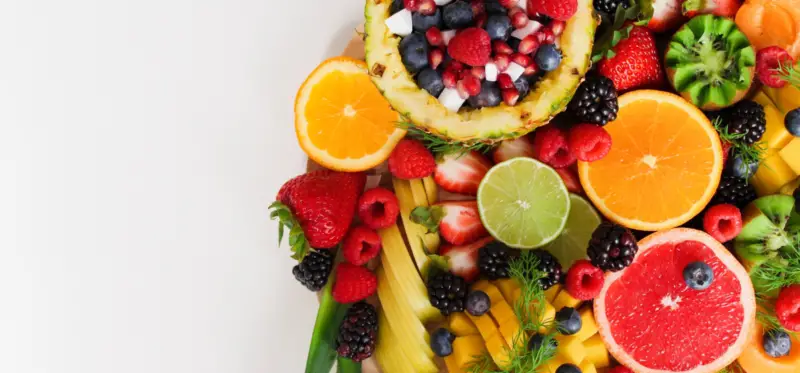
If you’re considering offering pork to your pug, it’s important to explore healthier alternatives that can provide the necessary nutrients without posing any risks. Switching to other protein sources like chicken, beef, or lamb can help maintain a well-balanced diet without jeopardizing their health. These animal-based proteins are easily digestible and can be served either cooked or raw, following your veterinarian’s guidelines.
In addition to meat, incorporating vegetables and fruits into your pug’s diet offers essential vitamins, minerals, and fiber. Options such as carrots, green beans, and sweet potatoes are safe for pugs when served in moderation. Pugs can safely consume a wide range of fruits, including apples, bananas, and blueberries. Always remember to remove seeds and cores before feeding fruits to your pug.
Another way to supplement your pug’s diet is by offering whole grains such as rice or quinoa. These grains provide essential carbohydrates and can easily be mixed with meats or vegetables. Ensure to cook the grains properly and avoid adding additional salts or seasonings.
Lastly, choosing the appropriate treats for your pug can directly impact their overall health. Numerous store-bought options are available, but it’s important to pay attention to the ingredients and nutritional content. Opt for natural and low-calorie treats or even consider offering pieces of the aforementioned fruits, vegetables, or lean meats as a rewarding snack.
By offering your pug a well-rounded diet consisting of these healthier alternatives, you can ensure they receive the necessary nutrients to thrive while minimizing any potential risks associated with feeding pork.
Can Pugs Eat Other Human Foods
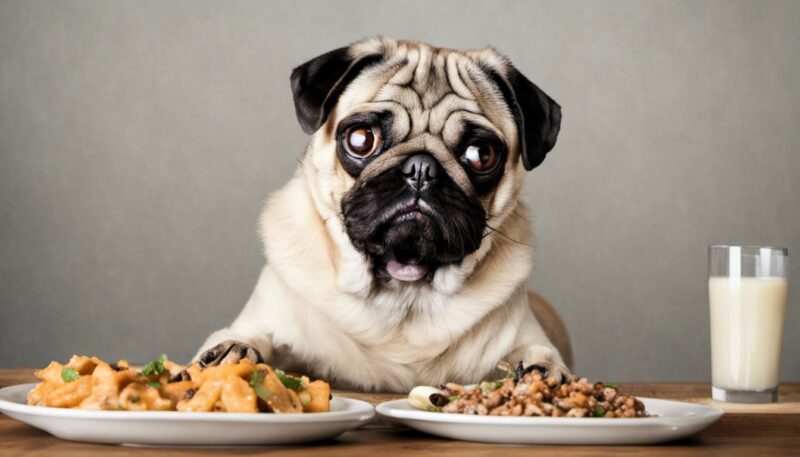
While you may be curious about feeding your pug pork, you must be cautious about other human foods your beloved pet can consume. Several human foods are safe for pugs to enjoy as long as they are fed in moderation.
Firstly, hot dogs can be given to your pug as an occasional treat. However, ensure to choose low-sodium, plain hot dogs to avoid any adverse effects on your pug’s health. Besides, cutting them into small pieces is best to prevent choking hazards.
Cheese is another human food that pugs can have in small amounts. Just be mindful of the fat content in cheese, as excess fat can cause issues like pancreatitis in dogs. When sharing with your pug, choose low-fat cheese options like mozzarella or cottage cheese.
Eggs are a great source of protein and other vital nutrients for your pug. You can feed them cooked and unseasoned eggs as a treat or an addition to their regular diet. However, avoid raw eggs as they may harbor harmful bacteria and lead to biotin deficiency in some cases.
Green beans are an excellent addition to your pug’s diet, as they are low in calories and rich in essential nutrients such as vitamins and minerals. You can offer your pug cooked green beans without any added salt, oil, or seasoning. Make sure to chop them into small pieces to avoid choking.
Mushrooms can be a tricky one when it comes to feeding your pug. While some store-bought mushrooms are safe for your pug to eat when cooked, several wild mushroom species can be highly toxic to animals. It is best to avoid feeding your pug mushrooms, as it can be challenging to identify safe varieties.
In conclusion, numerous human foods can be safely shared with your pug if you are mindful of portion sizes and ingredients. Monitor your pet’s reaction to new foods and consult your veterinarian for personalized advice on your pug’s diet.
Why Consult with a Vet
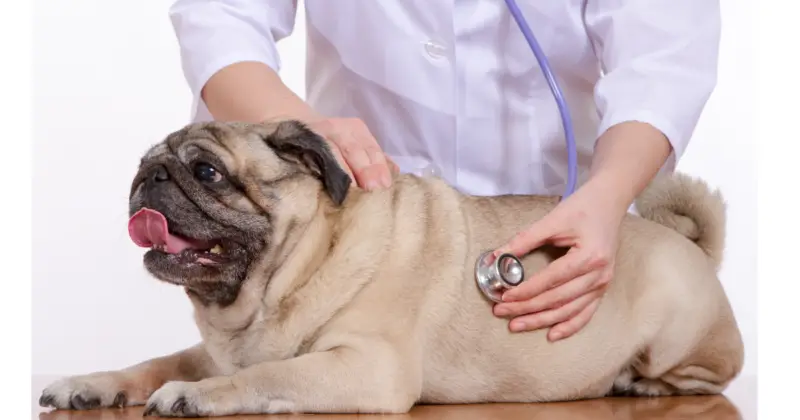
As a responsible pug owner, it is essential to consult with your vet before introducing pork or any new food to your pug’s diet. Your vet thoroughly understands your pug’s specific needs, potential dietary restrictions, and health risks. They can provide a tailored recommendation to ensure the health and well-being of your pug.
Vets know various food sources that can be dangerous or beneficial for dogs based on their breed, age, and overall health. Introducing pork to your pug without proper guidance may result in unforeseen health issues. Consulting with a vet ensures your pug receives the necessary nutrients without exposing them to any potential dangers.
Over time, your pug’s nutritional needs may change due to factors such as aging, health issues, or changes in activity level. Regular checkups with your vet are vital to monitor these changes and adjust your pug’s diet accordingly. Providing the correct balance of nutrients is crucial in maintaining their health and preventing obesity, which is a common issue among pugs.
Remember that every dog is unique, and your pug may have specific allergies, sensitivities, or dietary restrictions that could impact their ability to consume pork safely. By working closely with your vet, you can ensure your pug’s dietary needs are met and any potential issues are promptly addressed.
In conclusion, consulting with a vet is the safest and most effective way to introduce new foods, such as pork, into your pug’s diet. Their expert advice and guidance will help ensure your cherished pet’s continued health and well-being.
Frequently Asked Questions: Can Pugs Eat Pork
Can pugs consume cooked pork chops?
Yes, pugs can consume cooked pork chops, as long as they are properly prepared. Make sure the pork chops are cooked thoroughly, with no seasoning or sauces containing harmful ingredients for dogs. Always remove any bones before serving them to your pug, as they can pose a choking hazard or cause internal damage.
Is it safe for pugs to eat pulled pork?
It is generally safe for pugs to eat pulled pork, but you should be cautious about the ingredients and preparations. Avoid giving your pug pulled pork that contains seasonings, spices, or sauces, as some ingredients may be harmful to dogs. It’s best to provide them with plain, cooked pulled pork without any additives.
What are the benefits of pork for pugs?
Pork is a good source of protein, which is essential for your pug’s muscle development and overall health. It also contains essential nutrients such as vitamins B6 and B12, which help support the nervous system and energy metabolism. Additionally, pork provides zinc and iron, which contribute to a healthy immune system and blood cell function.
Can a pug eat raw pork safely?
It is not recommended for pugs or any other dogs to consume raw pork, as there is a risk of bacterial contamination, such as Salmonella or E.coli. These bacteria can cause severe gastrointestinal issues and could potentially be life-threatening. It’s essential to cook pork thoroughly before feeding it to your pug to kill any harmful bacteria.
How to prepare pork mince for pugs?
To prepare pork mince for your pug, cook it thoroughly in a non-stick pan without using any oil or seasonings. Make sure it is cooked until it is no longer pink in the center to ensure it is safe for consumption. Once cooked, let it cool down to room temperature before serving a small portion mixed with your pug’s regular dog food.
Why is pork not commonly used in dog food?
Pork is not as commonly used in dog food due to the higher fat content compared to other meat sources like chicken or beef. Additionally, some dogs may be sensitive to pork, causing allergies or gastrointestinal issues. However, if your pug is not allergic and you can find a high-quality pork-based dog food, it can still be a nutritious option for your dog.

